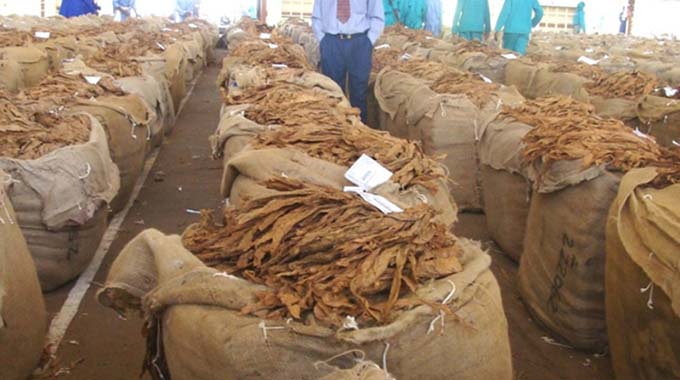
Obert Chifamba
Agri-Insight
THE most recent statistics from the Tobacco Industry and Marketing Board (TIMB) indicate that farmers had sold 28,2 million kilogrammes of the golden leaf with a value of US$64,4 million by the end of last week.
This marks a colossal jump from the US$18,6 million generated during the same period last year, after 10,5 million kg of tobacco went under the hammer. Obviously, such a development means more money and more value for farmers, especially coming against the gloomy background of the coronavirus outbreak that has seen all attention being focussed on saving lives, industries and markets.
The pandemic even delayed the start of the tobacco selling season, which only got underway on April 27, instead of the traditional February or March.
Farmers are getting 50 percent of their earnings in United States dollars with the other half coming in local currency at a fixed rate of US$1 to $25.
Measures put in place by Government to promote the smooth and safe selling of tobacco while preventing the spread of Covid-19 have, in a way, brought in a lot of sanity and have also taken care of the chaos that usually characterise the first days of the marketing season.
So far, the huge volumes of the golden leaf that have been delivered demonstrate that with some order, the season can be rolled out much faster than what usually happens in normal seasons.
Contract farmers so far account for an estimated 97 percent of the tobacco delivered with just three percent being traded at the auction floors.
Most farmers are happy with the orderly way things are happening although they have complaints here and there on how they should be doing their business.
Their biggest concern at the moment is on the payment system, which they feel has never been “farmer-friendly” for some seasons now.
The highest price so far has been US$6,60 per kg at the contract floors, while the highest price at the auction side has remained at US$4,99 per kg, a figure that contract auctions have in recent seasons, failed to go beyond.
It is the foreign currency complement that has made farmers’ lives more difficult than they had expected, as they have always failed to access it as cash while the fixed rate of US$1 to $25 has always left them licking bruised egos, as rates on the informal market that are usually adopted by service providers leave the value of their earnings eroded and therefore unable to meet all their expenses and enable them to fund a fresh season again.
Usually, seed and fertiliser suppliers peg prices of inputs using parallel market exchange rates, which makes it difficult, if not impossible, for the farmers to break even after selling their crop.
The current scenario, for example, where the parallel market foreign exchange rates are swinging between US$1 to $60 and $70 from about US$1 to $40, while the greenback is trading at an equivalent of $40 in cash from about $30, has left the farmers trapped in a catch-22 situation.
They need to buy inputs for next season, but before that they must settle debts from last season, which they may not be able to do given the runaway inflation currently bedevilling the economy. It would make a lot of sense if the farmers were to get their earnings using the prevailing exchange rate and not remain fixated at US$1 to $25.
Some contractors are reportedly making the farmers settle half of their debts in US dollars and the other in local currency, which means that the farmers will have to dig into their US dollar component again.
Farmers and their organisations have since started lobbying for a floating exchange rate or payment of a revised higher retention threshold of 75 percent in foreign currency to beat inflationary pressures. The situation on the ground easily justifies their complaints, as they are the ones feeling the heat of doing business using the local currency, which is being shunned by most service providers in their line of business. They are in fact, among the groups hardest hit by the loss of value of our local currency rated against the US dollar.
Essentially, tobacco farmers appear to be making money for the tax man, the auction floor, the black market, the contractor and in some cases the transporter, as they are always getting the smallest chunk of the pie yet they are the ones that toil.
The black market determines the rate at which the dollar will be trading against the local currency, which means those fuelling inflation also have their bite into the cherry.
It is time Government and other key stakeholders in the tobacco industry devote a few moments of their precious time to look into the plight of the tobacco farmer. Tobacco farming was highly lucrative when farmers adopted it in the aftermath of the land reform programme, when most of those that decided to grow the golden leaf were able to score huge developments in their lives.
The majority built decent houses, bought properties such as cars, tractors and in some cases, water engines in preparation for bigger hectarages and the unpredictable climatic changes currently affecting agriculture production.
All this seems to have vanished into thin air now as most tobacco farmers hop from one season to the next carrying debts they would have failed to service at the end of the previous season.
Some farmers have even lost property to messengers of court acting on behalf of contractors. Tobacco happens to be the most rewarding crop at the moment hence the need for some intervention on behalf of the farmers if the industry is to be salvaged from a possible demise.
The bulk of the tobacco sold at the auction floors currently comes from small-scale farmers who incidentally are the hardest hit by the volatile exchange rates rocking the economy.
